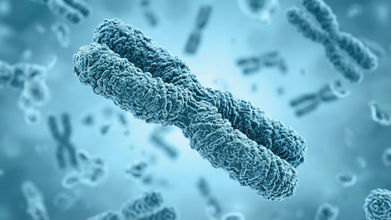- Health Conditions A-Z
- Health & Wellness
- Nutrition
- Fitness
- Health News
- Ayurveda
- Videos
- Medicine A-Z
- Parenting
This Easily Available Nutrient Can Also Slow Down Ageing

Credit: Canva
Vitamin D is well-known for supporting strong bones, but new research suggests it may also play a surprising role in slowing down the aging process itself. A new study published in The American Journal of Clinical Nutrition, reveals that daily vitamin D supplementation could help preserve telomeres—the protective caps at the ends of DNA strands—which naturally shorten as we age. Conducted by researchers at Mass General Brigham and the Medical College of Georgia, the reinforces anti-age studies indicating that the "sunshine vitamin" may slow biological aging at the cellular level.
Study Followed 1,000 People
The study, followed over 1,000 older adults in the US-men over 50 and women over 55. Participants were randomly assigned to receive either a placebo or a daily dose of vitamin D3 (2,000 IU) along with omega-3 fatty acids (1 gram). Telomere length in white blood cells was measured at the start, mid-point, and end of the study.
The results were striking. Compared to the placebo group, those taking vitamin D experienced significantly less telomere shortening—the cellular equivalent of aging three years more slowly. In contrast, omega-3 supplements did not have a significant effect on telomere length.
"Telomeres act like the plastic tips at the ends of shoelaces" explained study co-author Dr. JoAnn Manson, Professor of Women’s Health at Harvard Medical School. "They help protect our chromosomes from deterioration or fusion. As telomeres shorten with age, the risk of chronic diseases increases." This makes telomere length a powerful indicator of “biological age,” which may better reflect a person’s health status than chronological age alone.
Earlier results from the VITAL trial had already shown that vitamin D supplementation could reduce inflammation and lower the risk of advanced cancers and autoimmune diseases. Now, this new finding adds another layer of evidence in favor of vitamin D’s broader benefits for healthy aging.
“Our findings suggest that targeted vitamin D supplementation may be a promising strategy to counter the biological aging process,” said lead author Dr. Haidong Zhu, a molecular geneticist at the Medical College of Georgia. However, he emphasized that more research is needed to confirm whether these benefits apply across different populations and timeframes.
What Is Vitamin D Supplementation?
Vitamin D helps regulate the amount of calcium and phosphate in the body. These nutrients are needed to keep bones, teeth and muscles healthy. A lack of vitamin D can lead to bone deformities such as rickets in children, and bone pain caused by a condition called osteomalacia in adults. Government advice is that everyone should consider taking a daily vitamin D supplement during the autumn and winter.
People at high risk of not getting enough vitamin D, all children aged 1 to 4, and all babies (unless they're having more than 500ml of infant formula a day) should take a daily supplement throughout the year.
The best source of Vitamin D is sunlight. However, there are many food items through which you can get this essential nutrient. These include:
- oily fish – such as salmon, sardines, trout, herring or mackerel
- red meat
- egg yolks
- fortified foods – such as some fat spreads and breakfast cereals
- liver (avoid if you are pregnant)
The Science Behind Attachments And Fall-offs In A Relationship, According To Neuroscientist

Credits: Canva
Why do some relationships feel effortless and magnetic, while others slowly unravel despite our best intentions? According to neuroscientist Andrew Huberman, the answers lie deep within our early childhood experiences and the intricate wiring of the brain.
In a recent episode of Huberman Lab titled “Essentials: The Science of Love, Desire & Attachment,” Huberman explores how biology and psychology work together to shape the way we connect, commit, and sometimes drift apart. What makes the conversation compelling is how it bridges hard science with very human emotions.
Our First Bonds Shape Our Love Stories
Huberman begins with a powerful idea: the way we love as adults often echoes how we were loved as children.
He refers to the landmark “Strange Situation” experiment by psychologist Mary Ainsworth. In this study, toddlers were briefly separated from their caregivers and then reunited. Researchers closely observed how the children reacted. Some felt secure and soothed upon return. Others were anxious, avoidant, or distressed.
These early attachment patterns, Huberman explains, frequently resurface in adult romantic relationships. A securely attached child may grow into a partner who trusts and communicates well. An anxious child may become someone who fears abandonment. An avoidant child may struggle with emotional closeness.
The hopeful part? These patterns are not destiny. Awareness allows change. Once people recognize their emotional blueprint, they can reshape it.
Love Is Not in One Spot in the Brain
Romantic connection is not housed in a single “love center.” Instead, multiple brain regions activate in sequence to create desire, attraction, empathy, and long term bonding.
Huberman clears up a common myth about dopamine. Many people think of it as the pleasure chemical. In reality, it is more about motivation and pursuit. Dopamine fuels craving and drives us toward a person we find compelling. It is the chemical that makes you check your phone, wait for a message, or feel a rush at the thought of someone.
But desire alone does not sustain love.
For deeper attachment, empathy circuits come into play. The prefrontal cortex and the insula are especially important. The insula helps us sense our internal bodily state, a process known as interoception. It allows us to feel our own emotions while tuning into someone else’s. This shared emotional awareness strengthens bonds.
The Role of “Positive Delusion”
One of the most fascinating ideas Huberman discusses is what he calls “positive delusion.” For long term stability, the brain benefits from believing that your partner is uniquely special. This slight bias, almost a romantic illusion, reinforces commitment.
It is not about ignoring flaws. It is about genuinely feeling that this person, out of billions, holds a singular place in your emotional world. Biologically, this strengthens attachment pathways.
Why Relationships Fall Apart
Huberman also references research from the Gottman Lab at the University of Washington. Decades of data reveal four behaviors that predict relationship breakdown: criticism, defensiveness, stonewalling, and contempt.
Stonewalling happens when one partner emotionally withdraws and stops responding. But the most toxic behavior is contempt. Researchers have described it as acid to a relationship because it corrodes trust and shuts down empathy. Once contempt takes root, the neural circuits that support connection begin to weaken.
In the end, love is both chemistry and choice. Our brains may set the stage, but awareness, empathy, and daily behavior determine whether attachment deepens or quietly falls away.
Men Lose Their Y Chromosomes As They Age, Here's Why It Matters

Credits: Canva
For decades, scientists believed the gradual loss of the Y chromosome in ageing men did not matter much. But a growing body of research now suggests otherwise. Studies show that losing the Y chromosome in blood and other tissues is linked to heart disease, cancer, Alzheimer’s disease and even shorter lifespan. The crux is simple but striking. As men age, many of their cells quietly lose the Y chromosome, and this loss may be shaping men’s health in ways we are only beginning to understand.
Aging And The Disappearing Y Chromosome
Men are born with one X and one Y chromosome. While the X carries hundreds of important genes, the Y is much smaller and contains just 51 protein coding genes. Because of this, scientists long assumed that losing the Y in some cells would not have serious consequences beyond reproduction.
However, newer genetic detection techniques tell a different story. Research shows that about 40 percent of men aged 60 have some cells that have lost the Y chromosome. By age 90, that number rises to 57 percent. Smoking and exposure to carcinogens appear to increase the likelihood of this loss.
This phenomenon, known as mosaic loss of Y, does not occur in every cell. Instead, it creates a patchwork in the body where some cells carry the Y chromosome and others do not. Once a cell loses the Y, its daughter cells also lack it. Interestingly, Y deficient cells seem to grow faster in laboratory settings, which may give them a competitive edge in tissues and even in tumors.
Why Would Losing The Y Matter?
The Y chromosome has long been viewed as mainly responsible for male sex determination and sperm production. It is also uniquely vulnerable during cell division and can be accidentally left behind and lost. Since cells can survive without it, researchers assumed it had little impact on overall health.
Yet mounting evidence challenges that assumption. Several large studies have found strong associations between loss of the Y chromosome and serious health conditions in older men. A major German study reported that men over 60 with higher levels of Y loss had an increased risk of heart attacks. Other research links Y loss to kidney disease, certain cancers and poorer cancer outcomes.
There is also evidence connecting Y loss with neurodegenerative conditions. Studies have observed a much higher frequency of Y chromosome loss in men with Alzheimer’s disease. During the COVID pandemic, researchers noted that men with Y loss appeared to have worse outcomes, raising questions about its role in immune function.
Is Y Loss Causing Disease?
Association does not automatically mean causation. It is possible that chronic illness or rapid cell turnover contributes to Y loss rather than the other way around. Some genetic studies suggest that susceptibility to losing the Y chromosome is partly inherited and tied to genes involved in cell cycle regulation and cancer risk.
However, animal research offers stronger clues. In one mouse study, scientists transplanted Y deficient blood cells into mice. The animals later developed age related problems, including weakened heart function and heart failure. This suggests the loss itself may directly contribute to disease.
A New Chapter In Men’s Health
So how can such a small chromosome have such wide ranging effects? While the Y carries relatively few genes, several of them are active in many tissues and help regulate gene activity. Some act as tumor suppressors. The Y also contains non coding genetic material that appears to influence how other genes function, including those involved in immune responses and blood cell development.
The full DNA sequence of the human Y chromosome was only completed recently. As researchers continue to decode its functions, the message for men’s health is becoming clearer. Ageing is not just about wrinkles or grey hair. At a microscopic level, the gradual disappearance of the Y chromosome may be quietly influencing heart health, brain health and cancer risk.
Understanding this process could open new doors for early detection, personalized risk assessment and targeted therapies that help men live longer and healthier lives.
Udit Narayan’s First Wife Alleges She Was Forced to Undergo Hysterectomy, Files Police Complaint

Credits: Facebook
First wife of singer Udit Narayan, Ranjana Narayan Jha made serious allegations against him, claiming that he forced her to get hysterectomy. She filed a police complaint earlier this week at the Women's Police Station in Supaul district, Bihar.
She accused Udit Narayan and his two brothers Sanjay Kumar Jha and Lalit Narayan Jha and his second wife Deepa Narayan of a criminal conspiracy that lead to hysterectomy - the surgical removal of uterus, without her knowledge. As per an NDTV report, "She claimed she became aware of this only years later during medical treatment."
Udit Narayan's First Wife's Allegations
As per the complaint, Udit and Ranjana were married on December 7, 1984, in a traditional Hindu ceremony. Udit then moved to Mumbai in 1985 to pursue his music career. She later learned through media that he had married another woman Deepa. As per the complaint, he continued to mislead her whenever she confronted him.
As per the complaint, in 1996, she was taken to a hospital in Delhi under the pretext of medical treatment, where, she claims that her uterus was removed without her knowledge. She said that she was compelled to file a complaint years after being ignored. "You all know that Udit Narayan ji repeatedly makes promises but does not fulfill them. He has not done anything till now, which is why I have come to the Women's Police Station. I deserve justice," she said.
"Nowadays, I am constantly unwell and need his support. But Udit Narayan is neither saying anything nor doing anything. He came to the village recently and left after making promises once again," she said, as per a Hindustan Times report.
What Is Hysterectomy?
It is the surgical removal of one's uterus and cervix. There are different kinds of hysterectomy available, which depends on the condition of the patients.
Total Hysterectomy
This removes uterus and cervix, but leaves ovaries. This means the person does not enter menopause after the surgery.
Supracervical Hysterectomy
Removing just the upper part of the uterus and leaving the cervix. This could also be when your fallopian tubes and ovaries are removed at the same time. Since, you have a cervix, you will still need Pap smears.
Total Hysterectomy With Bilateral Salpingo-oophorectomy
This is the removal of uterus, cervix, fallopian tubes and ovaries. This will start menopause immediately after the surgery.
Radical Hysterectomy With Bilateral Salpingo-oophorectomy
This is the removal of uterus, cervix, fallopian tubes, ovaries, the upper portion of your vagina, and some surrounding tissue and lymph nodes. This is done to people with cancer. Patients who get this enter menopause right after the surgery.
© 2024 Bennett, Coleman & Company Limited

